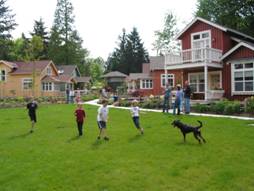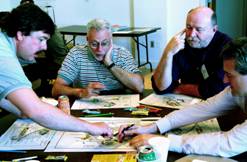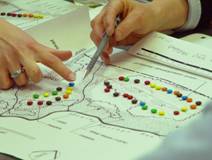![]()

Conover Commons Cottages, Redmond, WA
|
 Workshop
WorkshopThis workshop describes and illustrates practical, proven techniques for protecting community-wide open space networks through "conservation design" principles in updated zoning and subdivision ordinances, in a density-neutral manner consistent with underlying zoning. For example, Virginia’s Hanover County has conserved more than 5,000 acres in this manner, at no public cost, and without negative impacts on landowners.
This is a technique that is easy to use, and is particularly useful when economic limitations or political considerations preclude the wide-spread implementation of PDR programs to purchase development rights (which are very costly), or TDR programs to transfer densities from rural areas to serviced locations (which are politically challenging). The same holds true for the adoption of Urban Growth Boundaries.
This workshop session, with its optional Hands-on Design Exercise, helps developers and local officials work together to accomplish complementary goals: the construction of full-density residential subdivisions (developers' goal) in a way that helps build a community-wide network of permanent conservation land in a healthful, attractive manner (officials' goal).
The session is geared toward experienced members of planning boards and commissions and to professional planners who write codes and review site plans. Model zoning and subdivision ordinance language is provided to program participants, upon request.
The session draws on numerous examples, ranging from those built at lower rural densities using individual wells and septic systems, to those created at higher densities in serviced locations. Examples also span a wide spectrum of price points, from affordable to entry level to upscale.
|
|
In areas served by public water and sewer, this program shows how conservation design techniques can be readily combined with TND principles to create walkable, mixed-use neighborhoods, often involving higher-density infill projects and situations involving incremental growth around the community's outer edges. This part of the program, sometimes called “The Greener Aspects of the New Urbanism”, is based largely on my fourth book (Crossroads, Hamlet, Village Town: Design Characteristics of Traditional Neighborhoods, Old and New), and shows how higher density neighborhoods can still be designed around, and incorporate, distinctive features of the natural and cultural landscape, producing more interesting results. Clients determine the degree of emphasis placed on rural versus New Urban (TND) examples.
The program describes a simple four-step design process for laying out this kind of greener neighborhood, devised over years of experience where such developments have been reviewed, approved, financed, built, sold and lived in throughout the USA and Canada. In addition to illustrating several case studies in which this process has been successfully followed, the program describes additional design enhancements that improve marketability and bottom-line profitability (through lot premiums and faster absorption). Developments of this nature are "twice green" achieving both environmental and economic goals.
Finally, the program describes how this design process can fit into the local regulatory framework, through specific provisions in comprehensive plans, zoning ordinances, and subdivision regulations. As each conservation subdivision is completed, another link in the community-wide network of open lands is expanded, until ultimately an interconnected network of conservation areas is preserved.
Workshop Length: This workshop usually runs two hours for the illustrated program, 60-75 minutes for the design exercise, plus 30 minutes for discussion.
Hands-On Design Exercise: As a follow-up to thepowerpoint presentation, a participatory workshop (about 75 minutes long) is offered to provide attendees with an opportunity to learn first-hand how to design a neighborhood around the special features of any given property. Workshop participants have a chance to internalize what they have seen and heard during the powerpoint, by applying the four-step design process to a real parcel of land. Participants typically comment that this exercise makes the powerpoint more meaningful by helping them understand exactly how to implement the conservation design principles. This participatory workshop is where the learning curve rises steeply, and is especially recommended for those without much background in creative neighborhood design, such as local officials, engineers, surveyors (and even many land-use planners whose training was light on design).
Bonus: Model ordinance language, in electronic form, will be provided free to participants, on request.
 |
"We heard great things about your ideas and presentation, and you more than met our expectations."
--David Goudy, Montshire Museum of Science, Hanover, NH
"Thanks so much for an absolutely wonderful presentation. It was exceptionally well-suited to our audience of Placer and El Dorado County officials."
--Judy Corbett, Local Government Commission, Sacramento, CA
"I enjoyed hearing you again this summer. Your numerous visits to this state have had great repercussions. In almost every community where I work (in the Brainerd Lakes Area), there are thoughtful discussions about the merits of conservation design. This didn't happen until you showed up."
--Phil Hunsicker, Lakes Region Program Director, 1000 Friends of Minnesota
"I learned a lot in the short time you had with us (yes, you 'touched a life'). I now look forward to spreading the good word as I go around the Commonwealth."
--Leighton Powell, Scenic Virginia, Richmond, VA
 |
"There were nothing but rave reviews of your presentation."
--Hank Metcalf, Planning Board Chair, Orono, ME
"I am a Village Council member and just wanted to let you know how much I enjoyed our day, and how productive it was to me. Applying your ideas and perspectives will be of great value as we continue to deal with change, but preserve the uniqueness of our community."
--Douglas Lapins, Village Council, Pinehurst, NC
"Thank you for the time you spent with me in Montpelier recently. I found your presentation fascinating, and think your ideas for growth management and changes in our enabling laws deserve further attention. I will ask Commissioner Holmes to follow up on your suggestions."
--Madeleine M. Kunin, Governor, Montpelier, VT
"I cannot thank you enough for coming to Spartanburg. You were a tremendous hit. Thank you for the great job you did knitting trees into your open space story. Everyone was very pleased, and my boss’s wife said that you stole the show. I agree."
--Stewart Winslow, for the Noble Tree Foundation, Spartanburg, SC
"Rarely have I so clearly experienced the ‘scales falling off my eyes’."
--David Kay, Harvard, MA
"I want to thank you for the stimulating, informative, and inspiring presentation. We all felt energized by it, as well as gaining the in-depth understanding that you communicate so well. It was fun, too! Some of the town officials are quite ready, now, to launch into the Growing Greener program. Thank you for taking the time and effort to provide such an excellent and valuable evening. I only wish we could have you here every month!"
--Patty Elkis, AICP, Delaware Valley Regional Planning Commission, Philadelphia, PA
"As a result of your presentation we are making great progress in implementing your conservation design principles into our land use code. The response we received and the support to change some of our Land Use Code was amazing! Our Board of County Commissioners now fully supports the idea of implementing these principles into our code."
--Julia Stantic, La Plata County Community Development Office, Durango, CO
"It was quite amazing to see such a diverse group of people all smiling at the end of your presentation. The reception to your talk has stirred the hope we can find common ground among groups with diverse interests."
--Mary Schneidewind, Association for Intelligent Rural Management, New Paltz, NY
"Thank you for bringing in Randall Arendt for the workshop and lectures. He is a real inspiration and I’m very excited to have been a part of it. I had hoped to get him here myself, and would love to be part of any planning or brainstorming process that involves implementing more of these ideas."
--David Weintraub, ECO: Environmental and Conservation Organization, Hendersonville, NC
"Fascinating, effective, gifted speaker. I wish he could have spoken longer. Outstanding. Very enjoyable and informative. This was a wonderful presentation."
--Evaluation Comments, 9th Annual Planning Law Conference, Austin, TX
"The praise and accolades are still coming in.... It was a truly exceptional experience."
--Dana Beach, South Carolina Coastal Conservation League, Charleston, SC
"Thank you for such an excellent presentation. Many people expressed to me with great enthusiasm how stimulating your talk was. Your presentation was informative, provocative, and right on target about how conventional zoning is blind to the preservation of land."
--Michael Pessolano, Town Planner, Harwich, MA
"The local newspapers and e-mail have been buzzing ever since your inspired commentary. Thank you for being such a key contributor to the success of our gathering in Coeur d'Alene."
--Prof. Wendy McClure, Dept. of Architecture, University of Idaho, Moscow, ID
"Thank you so much for your contribution to the Your Town workshop -- and what a contribution it was! We witnessed a remarkable difference in the workshop participants after your presentation."
--Lisa Vogel, University of Georgia School of Environmental Design, Athens, GA
"The response to your workshop has been phenomenal. One planning commissioner actually rewrote his township zoning ordinance as a result."
--John Koches, Water Resources Institute, Grand Valley State University, Allendale, MI
"We want to thank you for coming to Moscow and presenting such an informative involving workshop on community design and development. Your ideas and outlook will influence decision makers here for a long time to come. You combined an engaging sense of humor with solid design background in an approach that brought our community together for a rare opportunity for self-analysis."
--Paul Agidius, Mayor, and Linda Pall, Council Member, Moscow, ID
"Thank you so much for your wonderful, evocative, excellent presentation at our conference. The audience was stunned and excited. You planted all kinds of wonderful idea seeds. I've organized a lot of workshops over the years and I can't remember another one that had such an immediate, positive impact."
--Lyn White, Canoe River Aquifer Advisory Committee, South Easton, MA
"Your visit with us served as a vital catalyst in the reformulation of our master plan. You have launched us into a new planning orbit."
--Richard Hull, Sugar Loaf Community Foundation, Sugar Loaf, NY
"Already I am receiving calls for a repeat performance. I shall try to fend them off till Spring, having seen your calendar myself."
--Therese Landry, Androscoggin Valley Council of Governments, Auburn, ME
"Given the continued positive response in the ensuing weeks, we can surely say that your visit was an unqualified success."
--John McNall, Citizens Advisory Committee, Honeoye Falls, NY
"Thank you for last Saturday's workshop. It was magnificent. There was an incredible amount of listening, learning, and enthusiasm for all you were saying. I have never seen our people so responsive."
--Joan Manzelman, Northern Oneida County Council of Governments, New Hartford, NY
"The evening workshop was such a success that we are already seeing results. On Friday a developer came into our office and said: 'I want to redesign my subdivision using principles that Randall Arendt talked about at the lecture last night'."
--Karen High, Jefferson County Dept. of Planning and Environmental Management, Louisville, KY
"I have had several people tell me that yours was the best program they have ever attended at a MMA convention".
--William Livengood, Esq., Maine Municipal Association
"I was absolutely inspired by your presentation in Grand Rapids last Friday. I stayed up half the night on Sunday and wrote a new 'vision for our township'."
--Stuart Cok, Algoma Township, Kent County, MI
"Our town passed the Open Space Bylaw almost overwhelmingly, with only four dissenting votes. The Planning Board feels that without your expertise in educating our residents, this bylaw would not have been successfully adopted."
--Kathleen Mull, Planning Board, Littleton, Massachusetts
"From the conference evaluations, your presentation was overwhelmingly selected as the portion of the program the members of the audience felt to be the most useful to them. I would be interested in learning how to obtain a copy of your video."
--Ben Starrett, Florida Dept. of Community Affairs, Tallahassee, FL
"Your workshop was ranked the highest by the participants in terms of overall knowledge gained and practical application. Comments on the evaluation forms include: excellent, thought-provoking, effective, and fantastic."
--Raymond Godfrey, Soil Conservation Society of America, Winooksi, VT
"Your ideas will have a lasting impact on the town. Already one developer is proposing to devote part of a major project to an extremely creative cluster design."
--Benjamin Frost, Town Planner, Kittery, ME
"On behalf of the Acton Planning Board I would like to express our sincere appreciation for your presentation of the conservation design concept at our Special Town Meeting. Your presentation was instrumental in getting the provisions passed."
--Roland Bartl, Town Planner, Acton, MA
"Thanks for the inspiration, the materials, and for putting them in a format that makes it easy to bring directly into the classroom."
--Prof. Elmina Hilsenrath, Landscape Architecture Program, University of Maryland